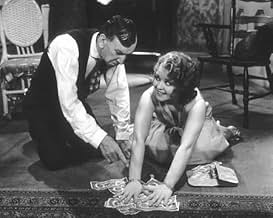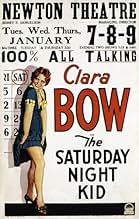PUNTUACIÓN EN IMDb
5,8/10
319
TU PUNTUACIÓN
Añade un argumento en tu idiomaMayme and sister Janie are salesgirls in Ginsberg's Department Store. Mayme is in love with store clerk Bill, but Janie tries to steal him from her. Hazel, another salesgirl, is Jean Harlow'... Leer todoMayme and sister Janie are salesgirls in Ginsberg's Department Store. Mayme is in love with store clerk Bill, but Janie tries to steal him from her. Hazel, another salesgirl, is Jean Harlow's first credited role.Mayme and sister Janie are salesgirls in Ginsberg's Department Store. Mayme is in love with store clerk Bill, but Janie tries to steal him from her. Hazel, another salesgirl, is Jean Harlow's first credited role.
Alice Adair
- Girl
- (sin acreditar)
Ernie Adams
- Gambler
- (sin acreditar)
Irving Bacon
- McGonigle
- (sin acreditar)
Getty Bird
- Riche Ginsberg
- (sin acreditar)
Eddie Dunn
- Jim
- (sin acreditar)
Bess Flowers
- Customer
- (sin acreditar)
Mary Gordon
- Reducing Customer
- (sin acreditar)
Jean Harlow
- Hazel
- (sin acreditar)
Leone Lane
- Pearl
- (sin acreditar)
Frank Ross
- Ken
- (sin acreditar)
Argumento
¿Sabías que...?
- CuriosidadesThe dress that Jean Harlow wears in the pageant scene was intended for 'Clara Bow', but Bow had gained too much weight to fit into it, so she convinced designer Edith Head to let the unknown actress to wear it. Harlow never forgot the favor.
- Versiones alternativasA silent version was released released simultaniously, with titles by Joseph L. Mankiewicz, for theaters that were not yet equipped for sound.
- ConexionesFeatured in Hollywood (1980)
Reseña destacada
THE SATURDAY NIGHT KID (Paramount, 1929), directed by A. Edward Sutherland, might have been an appropriate title for a jazz-age movie about a fun-loving party girl meeting and dancing with an assortment of young men every Saturday night. For this feature, the title is used for only a remake of a recent silent feature about shop girl sisters in LOVE 'EM AND LEAVE 'EM (Paramount, 1926) starring Evelyn Brent, Lawrence Gray and Louise Brooks, directed by Frank Tuttle. Rather than having those three leading players reprise their roles in the latest sound edition based on the popular play by George Abbott, it was given to Clara Bow, James Hall and Jean Arthur instead. Having recently played a department store girl already in IT (Paramount, 1927), the movie that gave Bow her signature name as The "IT" Girl, it might have been more interesting to see how the movie might have turned out had Clara Bow starred in the sound remake of IT instead.
The basic plot deals with the Barry sisters, Mayme (Clara Bow) and Janie (Jean Arthur), a couple of New York City shop girls working for Ginsberg Department Store, residing in an apartment building overlooking the Brooklyn Bridge. Living next door to them is William Taylor (James Hall), a young clerk promoted to floorwalker at the same store, who happens to be loved by Mayme. After rising at 6:30 a.m. to prepare themselves for another day's work, the trio leave together, with Mayne and Bill traveling by bus while Janie hitches a faster ride in somebody else's automobile. As the employees gather together at a staff meeting headed by Mr. Ginsburg (Hyman Meyer), Miss Streeter (Edna May Oliver), the store's "oldest employee," arranges for the staging of an Employee's Welfare Club pageant. Janie, elected treasurer, uses the club money to give to landlord, Lem Woodruff (Charles Sellon), a bookie who cheats her of her winnings at off-track horse racing. Aside from having Mayme take the blame for the stolen money and talking her way out of staying late for inventory where Mayme fills in for her, Janie also takes further advantage of her sister by claiming Bill all to herself, causing friction for all concerned. Also in the cast are Ethel Wales (Lily Woodruff); Irving Bacon (Mr. McGonigle) and Mary Gordon. The blonde shop girl Hazel Carroll is played by the uncredited Jean Harlow (1911-1937). She can be spotted in a couple of brief scenes behind the counter, and later with her back of head towards the camera as she speaks a few lines of spoken dialogue.
Standard routine plot clocked at 62 minutes, THE SATURDAY NIGHT KID indicates the story might have been slightly longer had it not been for the noticeable jump-cut by the mid-way point. Some years before Jean Arthur would prove her range in comedies for Columbia Pictures, and work in three classic productions under the direction of Frank Capra, her conniving character gathers the most attention here, even though she might seem out of character by those familiar with her latter screen work. Arthur would return to shop girl/ department store roles to better advantage in EASY LIVING (Paramount, 1937) and THE DEVIL AND MISS JONES (RKO Radio, 1941), the latter highly recommended viewing. James Hall, the male co-star appearing much older than his true age, gets by with his man-in-the-middle-type performance. He would later appear opposite Jean Harlow in HELL'S ANGELS (United Artists, 1930), the epic war-drama that elevated Harlow from bit player to leading role status. Better known by film historians more for her silent productions than those produced during the sound era, THE SATURDAY NIGHT KID indicates how Bow might have succeeded better and longer in talkies had there been better scripts or more challenging roles in both comedy and drama to fit her needs. Quite good in comedy, Bow has her limited range here amusingly playing a gym appliance demonstrator at the store. Bow demonstrated her ability as a fine actress in both CALL HER SAVAGE (1932) and HOOPLA (1933), for Fox Studios before retiring from the screen forever. Yet her character as played in THE SATURDAY NIGHT KID is very much Bow material carried on from some from the silent movie era. Never distributed to video cassette, DVD nor presented on cable television, the film overall is a worthy rediscovery, especially those interested in the early films and career of both Jeans, Arthur or Harlow, or the "It" Girl Clara Bow with a new title name as "The Saturday Night Kid." (**)
The basic plot deals with the Barry sisters, Mayme (Clara Bow) and Janie (Jean Arthur), a couple of New York City shop girls working for Ginsberg Department Store, residing in an apartment building overlooking the Brooklyn Bridge. Living next door to them is William Taylor (James Hall), a young clerk promoted to floorwalker at the same store, who happens to be loved by Mayme. After rising at 6:30 a.m. to prepare themselves for another day's work, the trio leave together, with Mayne and Bill traveling by bus while Janie hitches a faster ride in somebody else's automobile. As the employees gather together at a staff meeting headed by Mr. Ginsburg (Hyman Meyer), Miss Streeter (Edna May Oliver), the store's "oldest employee," arranges for the staging of an Employee's Welfare Club pageant. Janie, elected treasurer, uses the club money to give to landlord, Lem Woodruff (Charles Sellon), a bookie who cheats her of her winnings at off-track horse racing. Aside from having Mayme take the blame for the stolen money and talking her way out of staying late for inventory where Mayme fills in for her, Janie also takes further advantage of her sister by claiming Bill all to herself, causing friction for all concerned. Also in the cast are Ethel Wales (Lily Woodruff); Irving Bacon (Mr. McGonigle) and Mary Gordon. The blonde shop girl Hazel Carroll is played by the uncredited Jean Harlow (1911-1937). She can be spotted in a couple of brief scenes behind the counter, and later with her back of head towards the camera as she speaks a few lines of spoken dialogue.
Standard routine plot clocked at 62 minutes, THE SATURDAY NIGHT KID indicates the story might have been slightly longer had it not been for the noticeable jump-cut by the mid-way point. Some years before Jean Arthur would prove her range in comedies for Columbia Pictures, and work in three classic productions under the direction of Frank Capra, her conniving character gathers the most attention here, even though she might seem out of character by those familiar with her latter screen work. Arthur would return to shop girl/ department store roles to better advantage in EASY LIVING (Paramount, 1937) and THE DEVIL AND MISS JONES (RKO Radio, 1941), the latter highly recommended viewing. James Hall, the male co-star appearing much older than his true age, gets by with his man-in-the-middle-type performance. He would later appear opposite Jean Harlow in HELL'S ANGELS (United Artists, 1930), the epic war-drama that elevated Harlow from bit player to leading role status. Better known by film historians more for her silent productions than those produced during the sound era, THE SATURDAY NIGHT KID indicates how Bow might have succeeded better and longer in talkies had there been better scripts or more challenging roles in both comedy and drama to fit her needs. Quite good in comedy, Bow has her limited range here amusingly playing a gym appliance demonstrator at the store. Bow demonstrated her ability as a fine actress in both CALL HER SAVAGE (1932) and HOOPLA (1933), for Fox Studios before retiring from the screen forever. Yet her character as played in THE SATURDAY NIGHT KID is very much Bow material carried on from some from the silent movie era. Never distributed to video cassette, DVD nor presented on cable television, the film overall is a worthy rediscovery, especially those interested in the early films and career of both Jeans, Arthur or Harlow, or the "It" Girl Clara Bow with a new title name as "The Saturday Night Kid." (**)
- lugonian
- 21 oct 2018
- Enlace permanente
Selecciones populares
Inicia sesión para calificar y añadir a tu lista para recibir recomendaciones personalizadas
Detalles
- Fecha de lanzamiento
- País de origen
- Idioma
- Títulos en diferentes países
- The Saturday Night Kid
- Localizaciones del rodaje
- Empresa productora
- Ver más compañías en los créditos en IMDbPro
- Duración1 hora 3 minutos
- Color
Contribuir a esta página
Sugerir un cambio o añadir el contenido que falta

Principal laguna de datos
By what name was La chica de la noche del sábado (1929) officially released in India in English?
Responde























